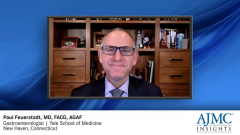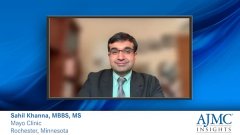
Opinion|Videos|January 6, 2025
Key Background Information on Recurrent C. Difficile Infections
Author(s)Sahil Khanna, MBBS, MS
Panelist discusses how recurrent Clostridioides difficile infection results from persistent microbiome disruption, where antibiotic-induced dysbiosis enables bacterial overgrowth and toxin production. Characterized by repeated episodes of colitis, it predominantly affects older, hospitalized patients with compromised immune systems, presenting significant clinical challenges through inflammatory complications and potential systemic spread.
Advertisement
Episodes in this series

Video content above is prompted by the following:
- Describe the pathophysiology of recurrent C difficile infection and what the potential complications of recurrent C difficile include.
- What is the role of the microbiome?
- Discuss the epidemiology and the risk factors for developing recurrent C difficile infection.
Newsletter
Stay ahead of policy, cost, and value—subscribe to AJMC for expert insights at the intersection of clinical care and health economics.
Advertisement
Advertisement
Advertisement
Trending on AJMC
1
TrumpRx Launch Brings Savings—and Uncertainty
2
As Cencora Closes With OneOncology, Patton Says Terms Show “Trust”
3
Exploring Identity, Appearance Experiences Among Patients With Alopecia
4
5 Things to Know About the Oral GLP-1 Era
5











